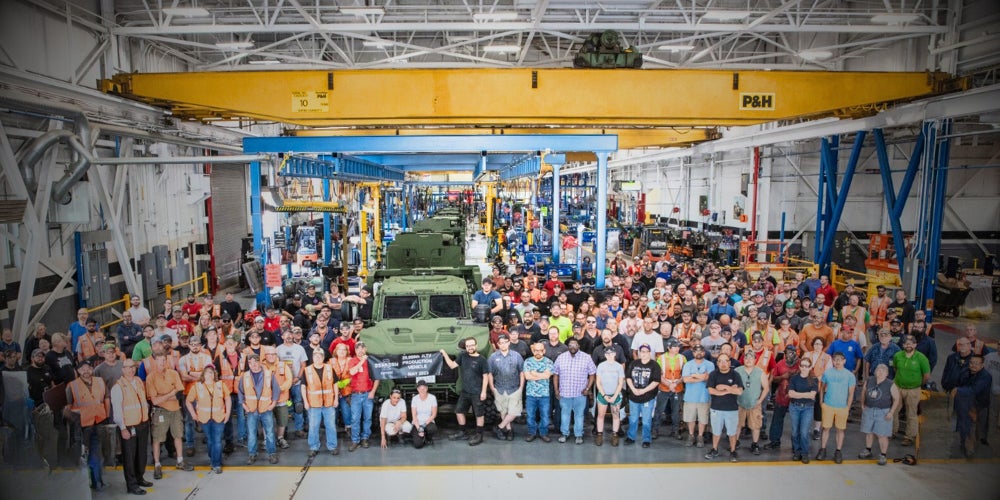A northeast Wisconsin manufacturer this month lost its appeal to keep a major military contract beyond 2024.
In March, Oshkosh Defense, a subsidiary of Oshkosh Corp., filed a protest with the nonpartisan U.S. Government Accountability Office, or GAO, over the U.S. Army awarding the follow-on contract to produce Joint Light Tactical Vehicles, or JLTVs, to another company.
Oshkosh Defense has built more than 20,000 JLTVs since being awarded the initial contract in 2015. But the Army gave the new $9.7 billion contract to Indiana-based AM General in February. The GAO denied Oshkosh’s protest on June 12.
News with a little more humanity
WPR’s “Wisconsin Today” newsletter keeps you connected to the state you love without feeling overwhelmed. No paywall. No agenda. No corporate filter.
Oshkosh Corp. is the largest employer in the city of Oshkosh, with 6,900 employees. Plans for the future of the JLTV plant on the city’s south side remain unclear.
Edward Goldstein, managing associate general counsel for Procurement Law at the GAO, said in a statement that Oshkosh Defense protested the Army’s evaluation of technical and price proposals. He also said Oshkosh argued that the Army did not give both companies equal treatment and should not have found AM General to be a contractor capable of executing the contract.
However, Goldstein said the GAO concluded that the Army’s evaluation of both companies’ proposals met federal requirements and did not engage in conduct that favored AM General over Oshkosh.
“GAO’s decision expresses no view regarding the merits of Oshkosh’s and AMG’s proposals,” he said. “Judgments about which offeror will most successfully meet the government’s needs are reserved for the procuring agencies.”

In a statement, Oshkosh Corp. said it was disappointed with the GAO’s decision, describing its proposal as the “lowest risk, best value solution.”
“As we move forward, we will continue to focus on our mission to provide the highest quality vehicles and technologies that enable our Warfighters to perform their missions and return home safely,” the statement read.
The GAO’s decision came after Oshkosh received support from Democratic U.S. Senator Tammy Baldwin, who sent a letter to the Army on June 7 that questioned the JLTV decision.
In the letter, Baldwin raised concerns about AM General being owned by a New York-based private equity firm. She said AM General had a “very high credit risk” and lacked the necessary workforce and experience to reliably manufacture JLTVs.
“Our service members rely on these vehicles and it’s irresponsible to risk a gap in production,” Baldwin said in a statement. “I remain concerned that the Army’s decision to award this contract to a New York private-equity-owned company that has never made these vehicles poses a risk for our service members and our national security.”
Oshkosh Corp. losing the JLTV business was also a point of discussion during the company’s first-quarter earnings call in April.
“We were disappointed to learn that we did not win the JLTV follow on contract,” said Oshkosh Corp. CEO John Pfeifer. “The contract was won at a pricing level that would be unacceptable to Oshkosh.”
He said the JLTV contract could affect the company’s 2025 financial targets, as it expected to retain it when setting its goals last year.
“That was kind of a negative hit to our 2025 targets,” Pfeifer said. “However, we’ve got a lot of positive things happening, too. We’re a growing organization.”
A spokesperson for Oshkosh Defense said via email the company can deliver JLTVs through September 2025 under the current contract, and its current backlog calls for production through 2024.
Beyond JLTVs, Oshkosh Defense workers produce transport and heavy fleet vehicles for the U.S. Army, the spokesperson said. Oshkosh Corp. also owns Pierce Manufacturing in Appleton, which builds fire and rescue equipment and trucks.

Pfeifer told the Milwaukee Journal Sentinel that Oshkosh Corp. has not determined next steps for the JLTV factory in Oshkosh. The company has some time to look for ways to repurpose the facility before the current contract ends.
During the April earnings call, he said the tactical vehicle market was “under pressure,” and the company was focusing its efforts on combat and delivery products and competing for other defense contracts.
Wisconsin Public Radio, © Copyright 2025, Board of Regents of the University of Wisconsin System and Wisconsin Educational Communications Board.






